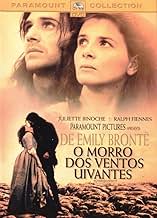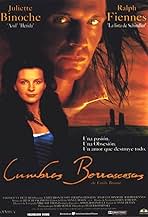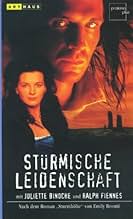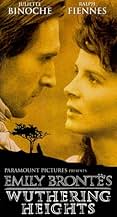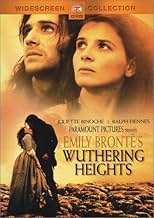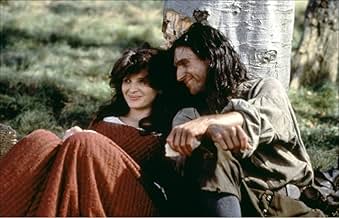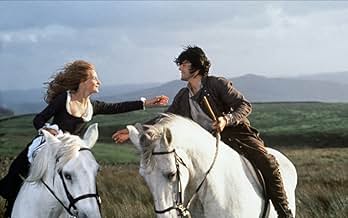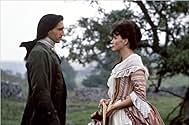A man becomes obsessed with vengeance when his soul mate marries another man.A man becomes obsessed with vengeance when his soul mate marries another man.A man becomes obsessed with vengeance when his soul mate marries another man.
- Awards
- 1 nomination total
- Director
- Writers
- All cast & crew
- Production, box office & more at IMDbPro
Featured reviews
Only recently have I got round to reading the Emily Bronte classic of 1847 and, having finished it, I immediately wanted to view this 1992 British film version. It is a faithful adaptation in terms of both narrative and language but, although it is filmed in North Yorkshire, both Wuthering Heights and Thrushcross Grange are represented as much larger and grander than I had imagined them. One other criticism: the dance scene is not in the novel and is incongruous because the Grange does not do entertaining.
A notable strength of director Peter Kosminsky's work is its casting. The bewitchingly beautiful Juliette Binoche plays both Catherine Earnshaw and her daughter Cathy Linton and one can imagine why a man would go mad for love of such a woman. As the tormented and cruel Heathcliff, Ralph Fiennes is credibly dark.
Another great virtue of this film version is that, unlike many other movie adaptations of this enigmatic novel, it covers the whole story, rather than stopping at the death of Catherine. The novel is a long one covering three decades, so no film can depict all the incidents, but arguably the most pivotal scene is when Catherine declares her intention to marry Edgar Linton while confessing her love for Heathcliff and this scene is there in this movie.
A notable strength of director Peter Kosminsky's work is its casting. The bewitchingly beautiful Juliette Binoche plays both Catherine Earnshaw and her daughter Cathy Linton and one can imagine why a man would go mad for love of such a woman. As the tormented and cruel Heathcliff, Ralph Fiennes is credibly dark.
Another great virtue of this film version is that, unlike many other movie adaptations of this enigmatic novel, it covers the whole story, rather than stopping at the death of Catherine. The novel is a long one covering three decades, so no film can depict all the incidents, but arguably the most pivotal scene is when Catherine declares her intention to marry Edgar Linton while confessing her love for Heathcliff and this scene is there in this movie.
I first happened across this movie on cable, and found myself absolutely captivated by Ralph Fienne's portrayal of Heathcliff. I can think of no better actor for the part, as Fiennes speaks volumes with his eyes alone, and magnificently portrays the tortured, twisted protagonist/antagonist. The rest of the lead cast is likewise brilliant, especially with regards to Juliette Binoche's endearing Catherine. The movie strays from Bronte's novel only on minor issues, and overall, performs in a manner worthy of the classic story.
The sensitive and masterful score by Sakamoto is almost a character in itself. Listening to it without distraction, it is almost impossible not to absorb the desolate and haunting mood of the film. The choice of locale for the movie was absolutely perfect, capturing the metaphors represented by the two great houses and the stark English moor.
This is definitely one of my favorite movies of all time, and one of the few occasions in which it may equal or even supercede the original novel. A must-see for fans of twisted period romances or anyone interested in pondering the roles of love and evil in the human soul.
The sensitive and masterful score by Sakamoto is almost a character in itself. Listening to it without distraction, it is almost impossible not to absorb the desolate and haunting mood of the film. The choice of locale for the movie was absolutely perfect, capturing the metaphors represented by the two great houses and the stark English moor.
This is definitely one of my favorite movies of all time, and one of the few occasions in which it may equal or even supercede the original novel. A must-see for fans of twisted period romances or anyone interested in pondering the roles of love and evil in the human soul.
Although I would not suggest this film to anyone who has not read the book first (you would be thoroughly confused and missing out on major details of the plot!) I found Wuthering Heights (1992) to be the ideal visual aid to compliment the tragedy and passion of Heathcliff and Catherine's story. If Emily Bronte were alive, she herself would have cast Ralph Fiennes as Heathcliff (he was born for the role!) and Juliette Binoche was perfect particularly when she showed the more playful and childish sides of Catherine (her laughter was exactly as I had imagined - bright and bold...and just irritating enough that it really would drive Heathcliff - and later, Hareton - to suffer from wounded pride when it was directed at their egos). The beauty of this story is that you never really can decide who is the villain and who is the victim....
Famously, this portrays for the first time the whole of the story in the book, it is captivating and moves fast, and Fiennes deserves superlatives as the diabolical Heathcliff, menacing but with the eyes of a wounded animal.
There's something worthwhile here. That is the love story with love that was not consummated, not allowed to because they were from different worlds, because even though they connect in a deep way, the rules of the game say otherwise. Different times, but you can assume that it used to be so at Bronte's time, as it was later in Tolstoy's.
So they part, but they have grown roots so deep in each other, they cannot be parted, and distance only tears at them, distorts who they are, the distortion as memory. In the prisonworld Heathcliff creates in the end as punishing demigod of sorts, without which the story is incomplete, we can see the stark reflection of both the broader unjust world responsible for Heathcliff, and his private hell of vengeful recurring thoughts, both that stifle the soul.
All that is good enough in the film.
We get to puzzle about the name of Heathcliffe's adopted son being inscribed in a stone epigraph, on the door of a manor that was built centuries ago.
What isn't very satisfying is how we arrive at the story. The character who it is being narrated to, arrives at the manor, pores over books and images of Catherine, is captivated enough to dream of her, which leads to the housemaid's narration of the events. Instead of a dream, the visitor here sees Catherine's ghost, which sets a supernatural tone that is too obvious.
Too obvious because though even Bronte suggested ghosts, her main narrative gambit was layered dreaming, the notion that the hidden life of images and urges shapes the narrator's choosing of the story he tells about himself and things, some of which we externalize as destiny or demons, which is what we all do each time we remember, we dream of a story around a fictitious self.
But it's wonderful and moving as it is.
There's something worthwhile here. That is the love story with love that was not consummated, not allowed to because they were from different worlds, because even though they connect in a deep way, the rules of the game say otherwise. Different times, but you can assume that it used to be so at Bronte's time, as it was later in Tolstoy's.
So they part, but they have grown roots so deep in each other, they cannot be parted, and distance only tears at them, distorts who they are, the distortion as memory. In the prisonworld Heathcliff creates in the end as punishing demigod of sorts, without which the story is incomplete, we can see the stark reflection of both the broader unjust world responsible for Heathcliff, and his private hell of vengeful recurring thoughts, both that stifle the soul.
All that is good enough in the film.
We get to puzzle about the name of Heathcliffe's adopted son being inscribed in a stone epigraph, on the door of a manor that was built centuries ago.
What isn't very satisfying is how we arrive at the story. The character who it is being narrated to, arrives at the manor, pores over books and images of Catherine, is captivated enough to dream of her, which leads to the housemaid's narration of the events. Instead of a dream, the visitor here sees Catherine's ghost, which sets a supernatural tone that is too obvious.
Too obvious because though even Bronte suggested ghosts, her main narrative gambit was layered dreaming, the notion that the hidden life of images and urges shapes the narrator's choosing of the story he tells about himself and things, some of which we externalize as destiny or demons, which is what we all do each time we remember, we dream of a story around a fictitious self.
But it's wonderful and moving as it is.
Wuthering Heights (1992) was directed Peter Kosminsky. It is an excellent film adaptation of the novel by Emily Brontë. Two things make this movie memorable. One is that director Kosminsky chose to give us the full novel, carrying it into the second generation. (Most movies end with Heathcliff and Kathy, but this version continue with the interaction of their children.)
The second memorable aspect of the movie is the wonderful acting of the two leads. Juliette Binoche plays Cathy Earnshaw and Ralph Fiennes portrays Heathcliff. (Binoche also portrays her daughter Catherine Linton.) Fiennes is a brilliant actor, and La Binoche is incomparable. There's an extraordinary onscreen chemistry between them.
I'll make special mention of Janet McTeer, who portrays Ellen Dean, the housemaid who knows everyone's secrets. She does everything a supporting actor should do to enhance the power of the movie.
Wuthering Heights would work better on the large screen, but we saw it on DVD, and it worked well enough. The film has an anemic IMDb rating of 6.9. I think that's because the novel is so dark and grim. The movie itself is much better than the rating would suggest. My recommendation is to see it and decide for yourself.
The second memorable aspect of the movie is the wonderful acting of the two leads. Juliette Binoche plays Cathy Earnshaw and Ralph Fiennes portrays Heathcliff. (Binoche also portrays her daughter Catherine Linton.) Fiennes is a brilliant actor, and La Binoche is incomparable. There's an extraordinary onscreen chemistry between them.
I'll make special mention of Janet McTeer, who portrays Ellen Dean, the housemaid who knows everyone's secrets. She does everything a supporting actor should do to enhance the power of the movie.
Wuthering Heights would work better on the large screen, but we saw it on DVD, and it worked well enough. The film has an anemic IMDb rating of 6.9. I think that's because the novel is so dark and grim. The movie itself is much better than the rating would suggest. My recommendation is to see it and decide for yourself.
Did you know
- TriviaSinéad O'Connor makes an uncredited appearance as Emily Bronte.
- Quotes
Heathcliff: I pray one prayer, I repeat it till my tongue stiffens. Catherine Earnshaw, may you not rest as long as I am living! You said I killed you, haunt me, then!... Be with me always, take any form, drive me mad, only do not leave me in this abyss, where I cannot find you!... I cannot live without my life. I cannot live without my soul.
- ConnectionsFeatured in MsMojo: Top 10 Movie Couples Who Are Actually Toxic (2019)
- How long is Wuthering Heights?Powered by Alexa
Details
- Release date
- Countries of origin
- Official sites
- Language
- Also known as
- Wuthering Heights
- Filming locations
- East Riddlesden Hall, Bradford Road, Riddlesden, Keighley, Bradford, West Yorkshire, England, UK(Heathcliff works in the carding shed)
- Production company
- See more company credits at IMDbPro
- Runtime
- 1h 45m(105 min)
- Color
- Sound mix
- Aspect ratio
- 1.85 : 1
Contribute to this page
Suggest an edit or add missing content


